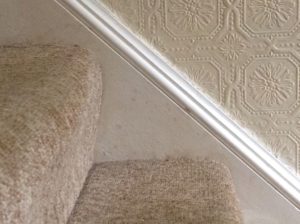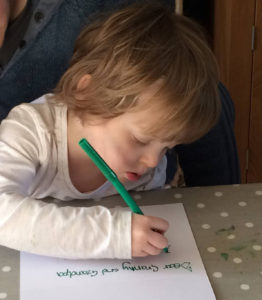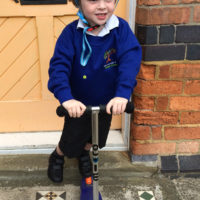For many young people this week has been the start of a new phase in their lives. In my family my oldest grandson was proudly driven hundreds of miles, in a car packed to the roof, to begin his university career. My youngest grandson donned his crash helmet and scooted his way to ‘big’ school, just like many other 4 and 5 year olds across the land. Both my daughters cried.
Of course they cried about this big life shift but perhaps the bigger issue has to do with how well these grandsons are equipped to manage these next-stage learning environments? How well do they know themselves as learners and who is around to help?
In the case of my eldest grandson, despite fourteen years of schooling, he knows little about himself as a learner. He has neither the vocabulary nor the tools that would enable him, consciously, to become a better learner; to become a self regulating, life long learner. Even at the level of study skills he has learned nothing about, for example, the limitations of working memory, or how to space and interleave practice, or how to make the best use of feedback. As a learning-aware family we have talked about which learning behaviours he would do well to strengthen, but unfortunately his teachers have yet to show any interest in the how of learning.
Recently he overcame his struggle in statistics; his grades shifted from ‘E’s to ‘A’s in a matter of weeks and of course the school should be given due recognition for trying him with a different teacher. But an opportunity to reflect on this transformation would have been ideal to help him understand himself as a learner. He’s also unaware of why, despite a deep love for the subject and putting in lots of time, he gained a disappointing mark in one bit of his A-levels. A skilled self-regulating learner would understand why and might have been able to fix the problem earlier.
But his mum is very happy; she’s done a good job on his cooking skills and is confident he’ll be able to cook most things for himself, and manage himself in his new environment. His school is probably patting itself on the back saying ‘Good job done. Grades achieved.’ But in terms of having an understanding of himself as a learner, with the tools to take charge of his own learning, he’s still at the early trial and error stage. Sadly this applies to most young people leaving our schools today, and a world away from this young woman who,recently left a school that took building confident learners seriously.
What an amazing start for a learning life.
And my youngest grandson? He too is unaware of himself as a learner…….as yet. But as a learning aware family we have been watching for and nudging some high value learning behaviours. His report from Pre-school tells us that he enjoys playing with others and using his imagination, but there’s more to his learning than that.
As he idly moves about in his bath making gentle waves which cover and the uncover a car he is holding on the side of the bath he quietly says that when the water goes over the car the car gets bigger. So while we may marvel at his ‘discovery’ of refraction and try to extend this in conversation, what’s really going on here is his attentive noticing behaviour…..just really seeing what’s out there. This valuable, emotionally sensitive learning behaviour is very easy to miss if you don’t know about it. But his mum has been recognising and nudging his noticing ever since he was not quite two, when he noticed the triangle shape made by stairs and skirting boards: “…and another triangle. And another triangle. And another triangle….” he would say every time he climbed the stairs.
And then there’s his tendency to placate people and seemingly understand where they are coming from. He has bags of empathy. And there’s his pleasure in spending hours playing happily by himself in his own imaginative world…he has masses of imagination and perseverance. And more recently he’ll often tell you that X and Y is because…….; the beginnings of reasoning. And so it goes on…this little chap, like most other four year olds, already uses many of the high value learning behaviours identified in the BLP framework.
Up to now it’s been his mum who has pointed out and named these behaviours, praised them and always encouraged them. And with more of the same, plus a bit of reflection on his own learning he would be on his way to becoming a self regulating learner.
But what of the formalised learning environment of the school classroom? Will this start be built upon? Will his teachers know about learning behaviours, be able to model them, praise them and nurture them? Will they be able to capitalise on these strengths and use them to ensure he thrives in the curriculum or will they squeeze these behaviours out and simply rely on him being able to repeat, retain, remember and regurgitate what he is being told?
What are the chances of my youngest grandson understanding far more about himself as a learner by the time he goes off to university? I may or may not be around to see it but if it is to be so then all our schools, primary and secondary, will need to be places that value the process of learning itself, where the how of learning is understood and given the same status as the what of learning.
Should I be confident or fearful?


I find this post really touching!
As parents and grandparents we all suffer the angst of having our expectations for their learning tested at the different stages of their education.
As an “expert” in developing learning in countless schools and educational settings you must experience in bucket loads with your grandchildren!
My experience is that good learners, aware of their own learning strengths pose a challenge to their teachers! Good teachers capitalise upon them, others see them as a threat! Sad but true!
The only way forward is to chip away at the current mindset, which challenges the imposed educational philosophy which is over politicised!
Let’s not forget Einstein’s maths teacher thought he was a dull child! Not recognising a child’s potential is an educational crime, but when the emphasis is on narrow, knowledge / fact based criteria, true educationalists are always going to be on the back foot.
Maryl has highlighted the contradiction in the current educational set up. Get the right grades – you’re a success – really?
Understanding the qualities of a good learner and recognising the potential for future learning and development are the key components of improving our current educational setup!
Finally, I wish all your grandchildren the very best. Gran needs to chill a little!